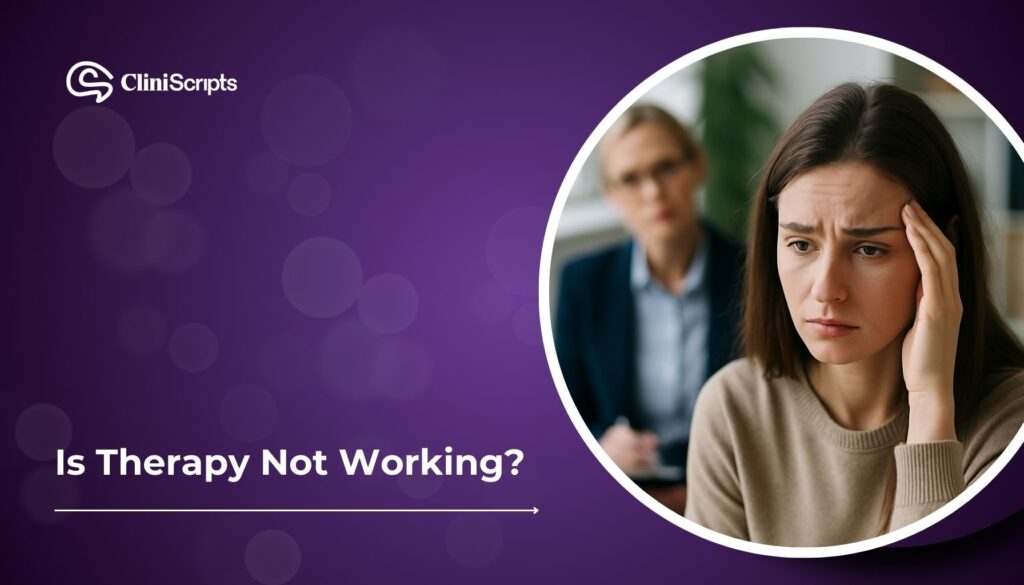Technically Reviewed By Nauman Jaffar
Why Does Therapy Not Work for Everyone: Uncovering the Reasons and Realities
Therapy has the potential to be life-changing, but it doesn’t always work for everyone. If you’ve ever wondered, “Why does therapy not work?” or felt that therapy isn’t helping, you’re not alone. Many people face challenges in therapy for a variety of reasons—from emotional readiness to cultural resistance and mismatched expectations. In some cases, even well-documented therapy notes and structured assessments like a Mental Status Exam may reveal deeper barriers to progress. Additionally, a lack of support from a qualified therapy aid or insufficient guidance from a medical scribe involved in tracking patient sessions can impact the therapeutic outcome. Let’s dive into why therapy may not be effective for some and explore the realities behind it, as often revealed in clinical observations and soap note examples.
Why Therapy May Not Be Helping You
First, let’s address some of the most common reasons people feel therapy is not working for them:
- Lack of Emotional Readiness: Therapy requires emotional vulnerability. If a person isn’t emotionally ready to confront painful experiences, therapy may not help. This lack of engagement may also be reflected in therapy notes, where progress appears minimal or stagnant. Sometimes, individuals may go to therapy without fully acknowledging their emotions or being open to change.
- Cultural Resistance: Cultural beliefs and stigmas around mental health can prevent people from fully embracing therapy. In some cultures, therapy may be seen as unnecessary or even a sign of weakness, causing resistance to the process—often noted during the Mental Status Exam or early session evaluations.
- Unrealistic Expectations: Many people come to therapy with high expectations—thinking that one or two sessions will lead to immediate relief. However, therapy is a gradual process, and progress may take time. Tools like soap note examples help therapists track session outcomes and communicate realistic goals to clients.
- Mismatch Between Therapist and Client: Not all therapists are a good fit for every individual. A mismatch in communication styles, therapeutic approaches, or values can hinder progress. In such cases, the involvement of a therapy aid or referral from a medical scribe who supports therapy sessions may help guide clients toward a better-suited provider.
Why Does Therapy Not Work for Some People?
Therapy may not work for some people for various reasons. These can range from internal factors, like readiness to external influences, such as financial barriers.
-
Personal Readiness and Commitment: “Why is therapy not helping me?” The answer could be that personal readiness and commitment are missing. If you’re not ready to fully engage in the process, therapy may not yield the desired results.
-
Mental Health Barriers: Individuals with deeper mental health issues, like severe depression or trauma, may struggle to benefit from therapy immediately. Therapy can be a long-term process that requires patience, and those with more profound issues might need more specialized care.
-
Financial or Insurance Challenges: Unfortunately, therapy is not always affordable or accessible. Why is therapy not free? Many people face financial barriers or have limited insurance coverage, making it difficult to continue or even start therapy.
Does Therapy Not Work for Everyone?
The simple truth is that therapy does not work for everyone. But this doesn’t mean therapy is ineffective. Instead, it suggests that therapy isn’t a one-size-fits-all solution. Here’s why:
-
Not Everyone Is Ready for Therapy: Some individuals may not be ready to address their issues head-on, making therapy a challenging and unhelpful process.
-
Therapy Might Not Be the Right Approach for Some: For some, other methods of support, such as peer support groups, medication, or lifestyle changes, may be more effective than traditional therapy.
-
Personal Beliefs About Therapy: “Why do some people not seek therapy?” The stigma around mental health can lead some individuals to avoid therapy altogether. Cultural beliefs, societal pressures, or negative experiences with therapy can all contribute to this avoidance.
When Therapy Is Not Helpful: Understanding the Limits
There are times when therapy may not be the right answer for someone. “When is therapy not helpful?” Here’s what you should know:
-
When the Fit Isn’t Right: A poor therapist-client match can make therapy ineffective. This is why it’s essential to find a therapist who understands your needs and makes you feel comfortable.
-
When You’re Not Ready to Change: Therapy works best when you are prepared to work through your issues. If someone is unwilling to make changes, therapy may not provide the results they hope for.
-
When External Factors Overwhelm: Stressful life events, financial struggles, or other overwhelming situations can sometimes make therapy less effective. It’s crucial to address external challenges that may be hindering progress.
Why Do Some People Not Like Therapy?
While many people benefit from therapy, why do some people not like therapy or even refuse to go altogether? Here are some common reasons:
-
Unrealistic Expectations: Some individuals expect immediate change and become frustrated when they don’t see instant results.
-
Feeling of Being Misunderstood: Some people feel that their therapist doesn’t truly understand them, leading to frustration and a lack of trust in the process.
-
Personal Beliefs: For some, therapy may not align with their personal beliefs about mental health. Cultural stigma or previous negative experiences can make them hesitant to return to therapy.
People Also Ask: Common Questions About Therapy
Here are some frequently asked questions about therapy that often come up on platforms like Quora and Reddit:
-
Why do some people not believe in therapy?
-
Some people don’t believe in therapy due to cultural stigmas, personal beliefs, or negative past experiences with therapy.
-
-
Is therapy not for everyone?
-
Therapy is not for everyone because it requires readiness, willingness to engage, and a good fit between therapist and client.
-
-
Does therapy really work?
-
Therapy can work wonders, but it depends on the individual’s readiness, the therapist’s approach, and the commitment to the process.
-
-
Why do people not go to therapy?
-
Barriers such as stigma, cost, time, and a lack of awareness about the benefits of therapy can prevent people from seeking help.
-
-
Why is therapy not covered by insurance?
-
In some areas, insurance may not fully cover therapy due to the cost of mental health services or the specific insurance policies in place.
-
Is Therapy Right for You?
If you’re questioning “Why is therapy not working for me?” or wondering if therapy is worth it, it’s important to reflect on your readiness and your relationship with your therapist. Therapy is a valuable tool, but it requires time, commitment, and the right fit to be effective.
Ready to make a change? Take the first step towards healing and self-discovery today. Whether therapy is the right path for you or not, remember that seeking support is always worth it. Reach out to a professional today and start your journey toward positive change.










